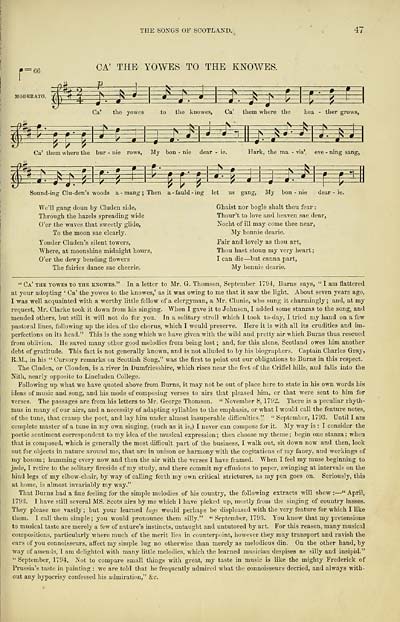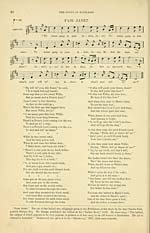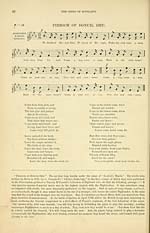Glen Collection of printed music > Printed music > Wood's edition of the songs of Scotland
(71) Page 47 - Ca' the yowes to the knowes
Download files
Complete book:
Individual page:
Thumbnail gallery: Grid view | List view

THE SONGS OF SCOTLAND.
47
= 66
WW
fes
CA* THE YOWES TO THE KNOWES.
-P-
^
*=fr
^mm
Ca' the yowes
m
to the knowes, Ca' them where the
l
hea - ther grows,
P^^£
£=fc
m
^m
Ca' them where the bur - nie rows, My bon - nie dear - ie. Hark, the ma - vis', eve - ning sang,
i
fes
££
m
w
*=;«
^^
t-a-
Sound-ing Clu-den's woods a - mang ; Then a-fau)d-ing let us gang, My bon - nie dear - ie.
We'll gang doun by Cluden side,
Through the hazels spreading wide
O'er the waves that sweetly glide,
To the moon sae clearly.
Yonder Cluden's silent towers,
Where, at moonshine midnight hours,
O'er the dewy bending flowers
The fairies danee sae cheerie.
Ghaist nor bogle shalt thou fear :
Thour't to love and heaven sae dear,
Nocht of ill may come thee near,
My bonnie dearie.
Fair and lovely as thou art,
Thou hast stoun my very heart ;
I can die — but canna part,
My bonnie dearie.
" Ca' the yowes io the knowes." In a letter to Mr. G. Thomson, September 1794, Burns says, " I am flattered
at your adopting ' Ca' the yowes to the knowes,' as it was owing to me that it saw the light. About seven years ago,
I was well acquainted with a worthy little fellow of a clergyman, a Mr. Clunie, who sung it charmingly ; and, at my
request, Mr. Clarke took it down from his singing. When I gave it to Johnson, I added some stanzas to the song, and
mended others, but still it will not do for you. In a solitary stroll which I took to-day, I tried my hand on a few
pastoral lines, following up the idea of the chorus, which I would preserve. Here it is with all its crudities and im-
perfections on its head." This is the song which we have given with the wild and pretty air which Burns thus rescued
from oblivion. He saved many other good melodies from being lost ; and, for this alone, Scotland owes him another
debt of gratitude. This fact is not generally known, and is not alluded to by his biographers. Captain Charles Gray,
R.M., in his " Cursory remarks ou Scottish Song," was the first to point out our obligations to Burns in this respect.
The Cluden, or Clouden, is a river in Dumfriesshire, which rises near the feet of the Criffel hills, and falls into the
Nith, nearly opposite to Lincluden College.
Following up what we have quoted above from Burns, it may not be out of place here to state in his own words his
ideas of music and song, and his mode of composing verses to airs that pleased him, or that were sent to him for
verses. The passages are from his letters to Mr. George Thomson. " November 8, 1792. There is a peculiar rhyth-
mus in many of our airs, and a necessity of adapting syllables to the emphasis, or what I would call the feature notes,
of the tune, that cramp the poet, and lay him under almost insuperable difficulties." " September, 1793. Until I am
complete master of a tune in my own singing, (such as it is,) I never can compose for it. My way is : I consider the
poetic sentiment correspondent to my idea of the musical expression ; then choose my theme ; begin one stanza : when
that is composed, which is generally the most difficult part of the business, I walk out, sit down now and then, look
out for objects in nature around me, that are in unison or harmony with the cogitations of my fancy, and workings of
iny bosom ; humming every now and then the air with the verses I have framed. When I feel my muse beginning to
jade, I retire to the solitary fireside of my study, and there commit my effusions to paper, swinging at intervals on the
hind legs of my elbow-chair, by way of calling forth my own critical strictures, as my pen goes on. Seriously, this
at home, is almost invariably my way."
That Burns had a fine feeling for the simple melodies of his country, the following extracts will show : — " April,
1793. I have still several MS. Scots airs by me which I have picked up, mostly from the singing of country lasses.
They please me vastly ; but your learned lags would perhaps be displeased with the very feature for which I like
them. I call them simple ; you would pronounce them silly." " September, 1793. You know that my pretensions
to musical taste ai-e merely a few of nature's instincts, untaught and untutored by art. For this reason, many musical
compositions, particularly where much of the merit lies in counterpoint, however they may transport and ravish the
ears of you connoisseurs, affect my simple lug no otherwise than merely as melodious din. On the other hand, by
way of amends, I am delighted with many little melodies, which the learned musician despises as silly and insipid."
"September, 1794. Not to compare small things with great, my taste in music is like the mighty Frederick of
Prussia's taste iu painting : we are told that he frequently admired what the connoisseurs decried, and always with-
out any hypocrisy confessed his admiration," &c.
47
= 66
WW
fes
CA* THE YOWES TO THE KNOWES.
-P-
^
*=fr
^mm
Ca' the yowes
m
to the knowes, Ca' them where the
l
hea - ther grows,
P^^£
£=fc
m
^m
Ca' them where the bur - nie rows, My bon - nie dear - ie. Hark, the ma - vis', eve - ning sang,
i
fes
££
m
w
*=;«
^^
t-a-
Sound-ing Clu-den's woods a - mang ; Then a-fau)d-ing let us gang, My bon - nie dear - ie.
We'll gang doun by Cluden side,
Through the hazels spreading wide
O'er the waves that sweetly glide,
To the moon sae clearly.
Yonder Cluden's silent towers,
Where, at moonshine midnight hours,
O'er the dewy bending flowers
The fairies danee sae cheerie.
Ghaist nor bogle shalt thou fear :
Thour't to love and heaven sae dear,
Nocht of ill may come thee near,
My bonnie dearie.
Fair and lovely as thou art,
Thou hast stoun my very heart ;
I can die — but canna part,
My bonnie dearie.
" Ca' the yowes io the knowes." In a letter to Mr. G. Thomson, September 1794, Burns says, " I am flattered
at your adopting ' Ca' the yowes to the knowes,' as it was owing to me that it saw the light. About seven years ago,
I was well acquainted with a worthy little fellow of a clergyman, a Mr. Clunie, who sung it charmingly ; and, at my
request, Mr. Clarke took it down from his singing. When I gave it to Johnson, I added some stanzas to the song, and
mended others, but still it will not do for you. In a solitary stroll which I took to-day, I tried my hand on a few
pastoral lines, following up the idea of the chorus, which I would preserve. Here it is with all its crudities and im-
perfections on its head." This is the song which we have given with the wild and pretty air which Burns thus rescued
from oblivion. He saved many other good melodies from being lost ; and, for this alone, Scotland owes him another
debt of gratitude. This fact is not generally known, and is not alluded to by his biographers. Captain Charles Gray,
R.M., in his " Cursory remarks ou Scottish Song," was the first to point out our obligations to Burns in this respect.
The Cluden, or Clouden, is a river in Dumfriesshire, which rises near the feet of the Criffel hills, and falls into the
Nith, nearly opposite to Lincluden College.
Following up what we have quoted above from Burns, it may not be out of place here to state in his own words his
ideas of music and song, and his mode of composing verses to airs that pleased him, or that were sent to him for
verses. The passages are from his letters to Mr. George Thomson. " November 8, 1792. There is a peculiar rhyth-
mus in many of our airs, and a necessity of adapting syllables to the emphasis, or what I would call the feature notes,
of the tune, that cramp the poet, and lay him under almost insuperable difficulties." " September, 1793. Until I am
complete master of a tune in my own singing, (such as it is,) I never can compose for it. My way is : I consider the
poetic sentiment correspondent to my idea of the musical expression ; then choose my theme ; begin one stanza : when
that is composed, which is generally the most difficult part of the business, I walk out, sit down now and then, look
out for objects in nature around me, that are in unison or harmony with the cogitations of my fancy, and workings of
iny bosom ; humming every now and then the air with the verses I have framed. When I feel my muse beginning to
jade, I retire to the solitary fireside of my study, and there commit my effusions to paper, swinging at intervals on the
hind legs of my elbow-chair, by way of calling forth my own critical strictures, as my pen goes on. Seriously, this
at home, is almost invariably my way."
That Burns had a fine feeling for the simple melodies of his country, the following extracts will show : — " April,
1793. I have still several MS. Scots airs by me which I have picked up, mostly from the singing of country lasses.
They please me vastly ; but your learned lags would perhaps be displeased with the very feature for which I like
them. I call them simple ; you would pronounce them silly." " September, 1793. You know that my pretensions
to musical taste ai-e merely a few of nature's instincts, untaught and untutored by art. For this reason, many musical
compositions, particularly where much of the merit lies in counterpoint, however they may transport and ravish the
ears of you connoisseurs, affect my simple lug no otherwise than merely as melodious din. On the other hand, by
way of amends, I am delighted with many little melodies, which the learned musician despises as silly and insipid."
"September, 1794. Not to compare small things with great, my taste in music is like the mighty Frederick of
Prussia's taste iu painting : we are told that he frequently admired what the connoisseurs decried, and always with-
out any hypocrisy confessed his admiration," &c.
Set display mode to: Large image | Transcription
Images and transcriptions on this page, including medium image downloads, may be used under the Creative Commons Attribution 4.0 International Licence unless otherwise stated. ![]()
| Special collections of printed music > Glen Collection of printed music > Printed music > Wood's edition of the songs of Scotland > (71) Page 47 - Ca' the yowes to the knowes |
|---|
| Permanent URL | https://digital.nls.uk/91338595 |
|---|
| Description | Scottish songs and music of the 18th and early 19th centuries, including music for the Highland bagpipe. These are selected items from the collection of John Glen (1833 to 1904). Also includes a few manuscripts, some treatises, and other books on the subject. |
|---|
| Description | The Glen Collection and the Inglis Collection represent mainly 18th and 19th century Scottish music, including Scottish songs. The collections of Berlioz and Verdi collected by bibliographer Cecil Hopkinson contain contemporary and later editions of the works of the two composers Berlioz and Verdi. |
|---|

